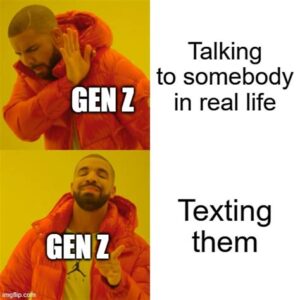Is Gen Z attached to their phone? Do they lack social skills? Are they “snowflakes”? Let’s look at who they are. The following is a list from Chat GPT, with my comments added. Do you agree with it?

- Digital Natives: Gen Z, born roughly between the mid-1990s and mid-2010s, is the first generation to grow up entirely in the digital age. They are adept at using technology and the internet from a very young age. For many this has had a huge impact on social interactions. They are often uncomfortable in traditional settings for business or networking as well as less formal settings with a variety of generations
- Diverse: Gen Z is the most racially and ethnically diverse generation in many Western countries. They tend to embrace and celebrate diversity more than previous generations. and are less concerned about gender identity or race.
- Entrepreneurial Spirit: Many Gen Z individuals are entrepreneurial and value independence. They are more likely to consider starting their own businesses or pursuing freelance work rather than traditional career paths. Due to their familiarity with social media many feel they can start successful businesses without seeking real expert advice. Those who succeed have sought mentors or coaches and are willing to take the advice.
- Socially Conscious: Gen Z tends to be socially and environmentally conscious. They are passionate about issues like climate change, social justice, and human rights, and they often use social media to advocate for causes they believe in. They can become overzealous without first learning facts. The recent campus demonstrations were a prime example as many had no clear understanding of the issues and were unwilling to learn, especially the history.
- Individualistic: While they are socially conscious, Gen Z also values individuality and personal expression. They tend to reject traditional labels and are more accepting of diverse lifestyles and identities. It is more common for many of them to have been raised in non-traditional environments.
- Tech-Savvy: Having grown up with smartphones and social media, Gen Z is highly tech-savvy. They are quick to adopt new digital platforms and are skilled at using technology to connect with others and access information which is an asset in general. They often do not filter where the information is coming from and how reliable it might be.
- Short Attention Spans: Due to the constant stimulation of social media and the internet, Gen Z is often characterized as having shorter attention spans than previous generations. They prefer bite-sized content delivered in visual and auditory modalities
- Financially Conscious: Despite growing up during economic uncertainty, many Gen Z individuals are financially conscious and manage money differently. They tend to use non traditional methods for saving. While cautious about taking on debt they represent $450 billion in spending power. They buy things because they saw it on social media and are loyal to companies that share their values. They can make or break a company.
- Education Focused: Gen Z values education and sees it as essential for achieving their career goals. They tend to be more pragmatic about their education, focusing on acquiring skills and knowledge that will help them succeed in the workforce. Despite some skepticism towards traditional degree pathways, Gen Z is enrolling in colleges and universities at high rates. However, access and affordability concerns remain significant, particularly for lower-income students. Growing numbers of students are exploring alternative educational pathways, such as vocational training, online learning, and apprenticeships, seeking skills-based education aligned with future career aspirations.
- Influencers: Gen Z is highly influenced by social media personalities and online influencers. They often look to these individuals for fashion trends, lifestyle inspiration, and product recommendations. Unfortunately, not all influencers have the best intentions and there have been issues with people being led astray and not investigating what is being touted as good for them.
For quite a while, people were critical of what they saw as a generation that was too coddled and “soft.” Gen Zers were called “snowflakes” and “unwilling to grow up.” But much of that negative judgment came from a misunderstanding of what it is like to grow up in today’s world when compared with how their elders grew up. As an example, Gen Zers have been criticized as lazy because they don’t have after-school or summer jobs. But many Gen Zers have been earning significant dollars online through a variety of activities, even including product placements on fashion-advice sites. Another example concerns drivers’ licenses: older people, for whom getting a driver’s license was a rite of passage toward adulthood, have criticized Gen Zers who do not rush to take their driver’s tests when they turn 16, but this criticism fails to consider that Gen Zers have no need to drive when they have ready access to ride services like Uber and Lyft.
Gen Z did not develop in isolation, they were shaped and molded by society and family; a typical Gen Zer is a self-driver who deeply cares about others, strives for a diverse community, is highly collaborative and social, values flexibility, relevance, authenticity and non-hierarchical leadership, and, while dismayed about inherited issues like climate change, has a pragmatic attitude about the work that has to be done to address those issues. They are the future leaders. We learn from them and teach them.
Recent Comments